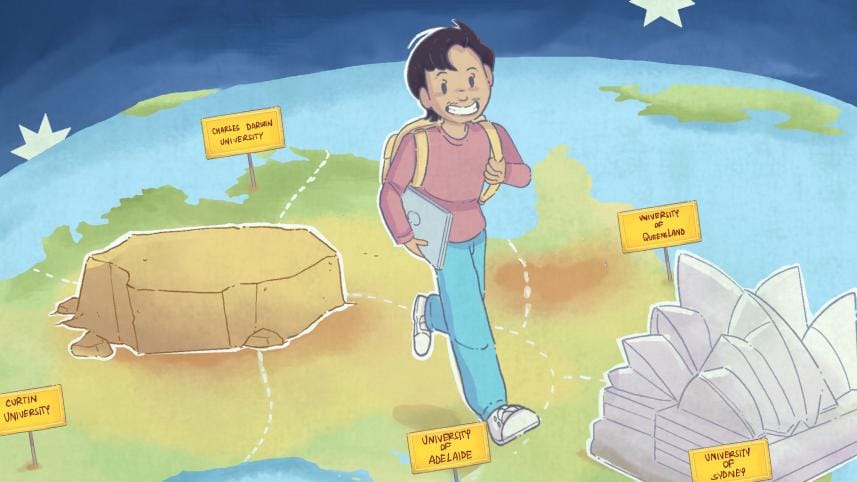Pursuing a master’s degree in Australia: What you should know

People from all over the world flock to Australia to explore its unique wildlife and experience a harmonious balance between work and life. Australia has also become the go-to destination for many young Bangladeshis looking to pursue higher studies abroad. But what is it actually like living Down Under?
This article will hopefully answer all burning questions regarding pursuing higher education in Australia and what comes along with it.
Now, why choose Australia in the first place?
Australia is home to 43 universities— 37 public universities and 6 private universities—and over 170 higher educational institutions. Several of these universities are highly ranked globally. Additionally, Australia offers one of the best work environments. Companies operating within the country's borders are known to emphasise work-life balance, inclusivity, and friendly and relaxed work environments. The country is also known for providing a high quality of life and favourable weather conditions, making it one of the top destinations for higher studies for international students.
Anor Ghosh, an Australian resident and an IT graduate from Western Sydney University, shares why he chose Australia as his study destination, "I was looking for a place where I could study and live decently without breaking the bank. One of my biggest deciding factors was the comfortable weather here. We have no harsh winters or sweltering summers, so I can walk around in a light jacket, and the experience has been great so far."
Postgraduate degrees in Australia take about one to two years to complete, while a PhD may take three or more, depending on the kind of research one is doing. Admissions here are conducted in multiple intakes, with the most popular one being the February intake. The February intake in Australia typically falls between the months of October to November. The application timeline for the July intake is April to March, and August to September is the time to reign in the less popular November intake.
Students looking to study here typically need a minimum CGPA of 3.00 (on a scale of 4.00) in their bachelor's to be considered for top master's programmes. However, in general, a CGPA between 2.50 and 2.75, on the same scale, should suffice.
Australia also has an English proficiency requirement that varies from university to university, but at the very least, a 6.5 in IELTS or any equivalent test puts you in the running for consideration. Some programmes or universities also require a proper expression of interest (EOI) or a statement of purpose for the application.
Like many countries, Australia also offers two kinds of master's degrees, one being a master's by research (MRes), which may require applicants to submit standardised test results, and the other being a master's by coursework. Other than academics, proper documents, a Genuine Temporary Entrant (GTE) document, a Confirmation of Enrolment (COE), bank statements, and verified or audited assets of the sponsor may be required for the visa processing, as is required by most other countries for those looking to study there.
Australia's Home Affairs department provides a list of specialised and in-demand subjects and professions that immigrants can use to match with their courses. Healthcare, teaching, IT, construction, engineering, and hospitality are some of the sectors in high demand at the moment.
Sayeed Abdullah, a master's student at Monash University, explains why he chose to pursue teaching as a prospective career in Australia, "There's a high scarcity of teachers in Australia, and teaching is a very in-demand subject."
Anor is pursuing a second bachelor's degree in Social Work from the University of South Australia because of the rising demand for the subject.
When choosing a university, one needs to consider all the aspects. Sadiya Afrin Snigdha, who is pursuing a master's in Information Systems at Deakin University, asserts, "I chose Deakin because of its high QS ranking, good alumni network, and thorough curriculum. Not only that, but the university provided me with a decent scholarship and an on-campus job, which solidified my decision."
If you are planning to get a master's degree in Australia, you might have to spend somewhere between AUD 44,000 to more than AUD 100,000 for a two-year programme. In other words, the cost of studying in Australia is not light on the wallet. It is worth noting that an annual cost of AUD 20,000 to AUD 25,000 might be expected to be expended, as living costs depend upon one's lifestyle and place of accommodation. Furthermore, most universities have an AUD 100 to AUD 200 non-refundable application fee for master's programmes, which may also put a strain on your pocket. The Australian government has an official website where one can calculate their estimated expenditure during their time in the country.
As an international student, a scholarship can take a huge chunk of the monetary load off your shoulders. While it doesn't allow for an extravagant lifestyle, the extra money saved makes day-to-day life a little easier and more comfortable.
"A scholarship made a huge difference in my master's journey," says Fariha Kabir, a Dean's Honor List awardee and Economics graduate from Monash University. "It precipitated my path towards a fully funded PhD."
Usually, these scholarships are issued before the start of the course and are presented based on the stellar academic excellence and financial standing of the applicant. Most universities in Australia offer institutional scholarships ranging from 20 to 100 percent but it varies from university to university. Scholarships are highly competitive, and a fully funded offer is hard to come by unless you show extreme academic rigour and prowess.
Academics aside, international students face two major challenges in the country – housing and employment.
Sidratul Oiisurjo, who is pursuing a master's in International Relations from Monash University, remarks, "Unless you have people willing to help you, getting a house here is extremely difficult because of all the additional documents that you have to provide. Shared housing is available if one can adjust to living with roommates, but student housing is extremely expensive on its own."
Besides, many landlords in Australia require the tenant's rental history, fixed income sheet, pay slip, or a recommendation letter from a previous landlord. As a result, house-hunting becomes an extremely difficult task for those new in the country.
Finding a job, on the other hand, is no easy feat either. However, it is not impossible. Australia offers a work restriction of up to 48 hours per fortnight during the school term, with a pay rate of around AUD 20 to AUD 25 per hour.
The work itself isn't necessarily easy. "I juggle two part-time jobs in my day-to-day life, which really keeps me on my toes. I had to look on various job sites and even do walk-in interviews until things fell in place," says Faria Hossain, a postgrad Business Analytics student at Macquarie University.
"One of the biggest mistakes people make when coming to Australia is underestimating the mindset shift required. Many arrive with certain expectations, only to find the reality more emotionally and physically demanding," reflects Syed Rakib Hassan, who is currently working as a marketing professional in Australia. "What we consider menial work in Bangladesh might be a good source of income in Australia. The only hurdle in getting and not getting a job is our mindset."
With the right mindset, preparation, and curiosity, Australia can offer far more than education. "Make meaningful connections," suggests Fariha. "Expanding your network and working smart can open doors that might have otherwise remained closed."
"For anyone willing to come to Australia, be prepared to work hard. Australia gives you the freedom to do anything, but with that comes great responsibility," affirms Faria.
Anor adds to this discussion, "Reach out to universities, talk to professors, make friends, and do everything to make life a little bearable. Amidst all the struggles, it is easy to get distracted, but the anchor and focus behind all the hard work should be your studies."



 For all latest news, follow The Daily Star's Google News channel.
For all latest news, follow The Daily Star's Google News channel. 
Comments